«Масленица» begins and that’s why «готовим блины!» [we’re making Russian pancakes!] Posted by josefina on Feb 8, 2010 in Uncategorized
Today is «8 (восьмого) февраля» [the 8th of February] and a Monday but not just any Monday – today is the Monday on which «Масленица» [‘Maslenitsa’; carnival, shrove] begins – also known as «сырная неделя» [cheese week] – in Russia. This used to be a «языческий праздник» [pagan holiday] back before Russia became a Christian country, a celebration of the sun and a way of marking the «конец зимы» [end of winter] and the «начало весны» [beginning of spring]. Since back in the days this ‘pagan party’ has been made to fit well into the Christian calendar, and is now celebrated during a whole week «до Великого поста» [before Lent]. Lent 2010 starts «17 (семнадцатого) февраля» [17th of February] and ends on «4 (четвёртого) апреля» [the 4th of April]. The year 2010 will be a most interesting year as it will be the year when «Пасха» [Easter] is celebrated by «православные» [Orthodox Christians], «католики» [Catholics] and «протестанты» [Protestants] on one and the same day – the 4th of April!
But before Easter there’s Lent. And what exactly do Russians eat before giving up such things as meat, dairy and alcohol for lent? I bet you already knew: «блины» [pancakes] of course!
Without a doubt, I am a very lucky girl. One of the reasons for this is because I have a good friend here in Yekaterinburg, «Саша» [Sasha] – or «Александр Александрович» [Alexander Alexandrovich] – who is «повар» [a cook]. Whenever I come over to his place, I always find him in the kitchen cooking me «что-нибудь вкусное» [something tasty]. About a week ago I asked him if he wouldn’t mind giving me a hand with preparing for «посты про русскую еду» [the posts about Russian food], and he agreed. Today I have the honor of bringing our very first culinary creation to my dear readers’ and fellow Russophiles’ attention! I present to you Sasha’s very own recipe for what he calls «сибирские блины» [Siberian pancakes]:
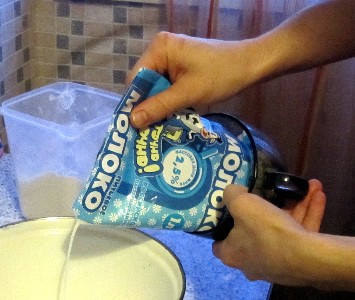
Start by pouring «1 (один) литр молока» [1 liter of milk] into a big bowl.
Then put into the same big bowl «700 (семьсот) грамм муки» [700 grams of flour]. (If you already can tell «мука» [flour] apart from «мука» [martyrdom, torment, agony] just by the way they’re pronounced – well, you’re a better person than I am! I still get them confused… and it’s just as much fun for the Russians every time).
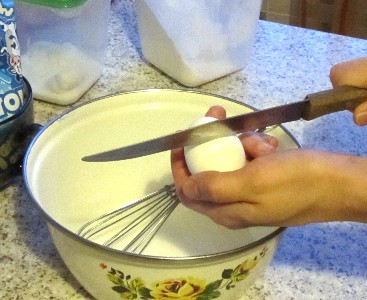
You’ll need «яйца – 3 (три) штуки» [eggs – 3 ‘pieces’]. (I didn’t know you could crack eggs with a knife, but «Саша» says that’s the simplest way and the only way that won’t make a mess of things. He’s the «повар» [cook] so he should know, right?)
After this add «соль по вкусу» [(fem.) salt according to (your) taste] and «0,5 (пол)стакана сахара» [half a cup of sugar] into the dough.
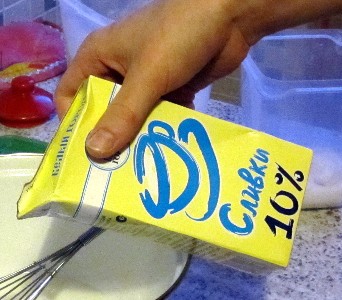
Then pour roughly «0,5 (пол)стакана сливок» [half a cup of (pl.) cream] into the bowl.
You’ll need «50 (пятьдесят) грамм сливочного масла» [50 grams of butter] «и чуть-чуть растительного масла» [and just a little vegetable oil] (pictured above is only the vegetable oil – by a brand poetically enough called «Щедрое лето» [The Generous Summer]).
As a finishing touch to make «тесто» [the dough] just the way you like it: pour more or less «1,5 (полтора) стакана воды» [1,5 cup of water], add «щепотка соды» [a pinch of soda] and «можно ещё немножко сметаны» [you can also add a little bit of ‘smetana’ (sour cream)] – «и тесто готово!» [and the dough is done!]
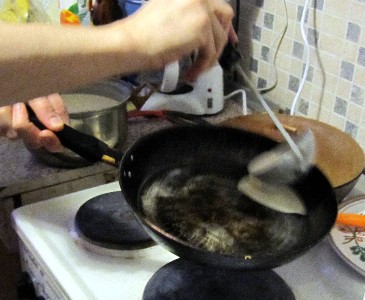
And now it’s finally «пора» [time] to start making «блины» [pancakes]!
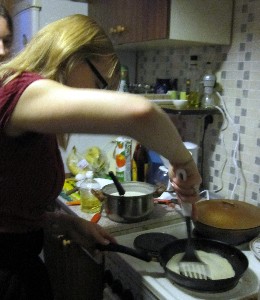
Careful, careful when flipping the «блин» over… Because the famous proverb «первый блин комом» [the first pancake becomes a clod, lump; ball, globe] didn’t turn up in Russian language out of nowhere but from experience! I hope you can see in the background how «Саша» is keeping a watchful eye on me and the process…
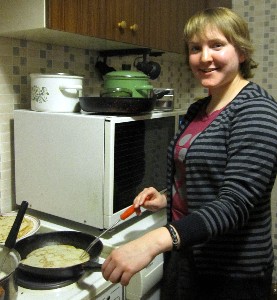
That’s more like it! My friend «Катя» [Katya] shows you how it’s done.
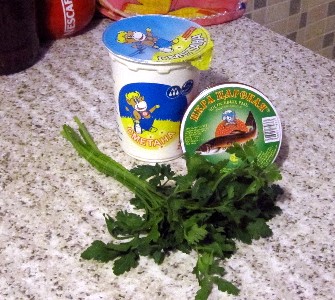
My serving suggestion: «красная икра» [red caviar] (because we can’t afford «чёрная икра» [black caviar]), «сметана» [‘smetana’; sour cream] and «петрушка» [parsley]. I have always thought that eating pancakes like this would be the ‘real’ and ‘true’ Russian way, but it turned that out none of my Russian friends had ever heard of this combination before… And now they claim I will give birth to a new myth «о русской кухне» [about Russian cuisine].
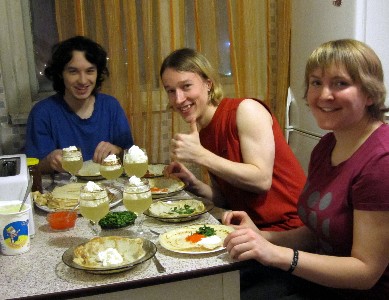
«Вася» [Vasya (Sasha’s brother)], «Саша» and «Катя» all know that the only right way «начать празднование Масленицы» [to begin the celebration of ‘Maslenitsa’] is «с улыбкой» [with a smile]! (In the glasses is a most tasty desert with jelly made from champagne and whipped cream on top…)
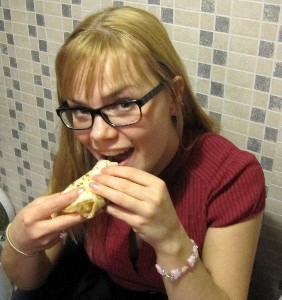
And now there’s nothing left to do but to «наслаждаться едой» [enjoy the food] and try to eat enough «перед Великим постом» [before Lent] so that you’ll last all the way «до Пасхи» [to Easter]…

Build vocabulary, practice pronunciation, and more with Transparent Language Online. Available anytime, anywhere, on any device.



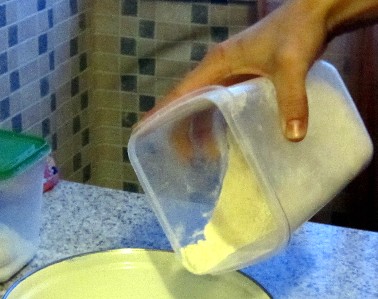
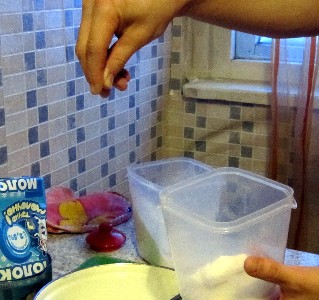

Comments:
Tvar:
spasiba. For pancake article and recipe.
I will make. I enjoy them.
I wish to be in Russian kitchen this year when revisit Rusia and help make pancakes with new friends.
Kerrie:
Thanks so much for a very entertaining and informative post! Now I’m off to make pancakes! :))
Andrew:
As a musician who has spent the past four years at a conservatory, hearing the word Масленица always makes me think of the opening of Stravinsky’s “Petrushka.” In case you’re unfamiliar with it, here’s a link to a video clip of the opening festival from a ballet production:
http://www.youtube.com/watch?v=wPX698CbDdo
Also, that recipe looks really tasty, and I will love to try it after I convert all the measurements to the English system so I don’t have a disaster in the kitchen!
On a final note, I am really enjoying reading this blog and I’m looking forward to every new post. Thanks so much for sharing your knowledge for all the readers to keep learning Russian!